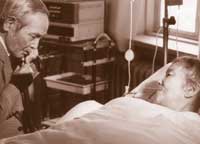
contact the culprit:
acid42@yahoo.com |
 HEART
AND SOUL HEART
AND SOUL
The Eiga Sai '99 Contemporary Japanese Filmfest Offers A Peek Into the
Heart of Japan
By Lionel Zivan S.Valdellon
published in The MANILA TIMES : Feb 21, 1999
I remember my film teacher explaining that cinema is a voyeuristic experience,
a way to view the private lives of characters onscreen. How true. It's
an escape into worlds different from ours-- and nowhere is this truer
than when watching foreign films. Suddenly you see exotic locations and
normal people thrust into bizarre situations--- the stories told with
different techniques and from startling points-of-view. You peek into
the hearts of the films' creators and discover what passions their cinematic
vision points toward.
___This year's Eiga Sai '99 Film Festival showcases varying strains of
Japanese passion in the form of 8 contemporary films. It runs in the Shangri-La
Plaza Mall, Cinema 1 from February 19 to 21, then heads for the UP Film
Center on February 23 till Feb 26, before settling down in CCP's Tanghalang
Manuel Conde on March 8 to 12. All screenings are free. Here's a sample
of what to expect:
SHALL WE DANCE?
This 1995 comedy from director Masayuki Suo won all 13 Japanese Academy
Awards and captured the hearts of audiences at the Sundance Film festival.
Here, the passion is for ballroom dancing not only for its enjoyment,
but because in director Suo's hands, it becomes a metaphor for life---
where trusting your partner, keeping to the beat and taking the all-important
first step all mean more than its face value.
___In Shall We Dance, a 42-year old average salary earner named Shohei
Sugiyama decides to sign up for ballroom dancing lessons because he spots
a beautiful but forlorn dance instructor named Mai staring out of the
window of the studio. Of course, he keeps it a secret from friends and
family because he doesn't want to be accused of being a D.O.M. At first,
it is only to appease his infatuation with her, but later on, he grows
to love dancing itself. Sugiyama's newfound, unselfish love for dance
has rekindled Mai's desire to compete in the ballroom competitions----
a desire that's been dormant for years. Meanwhile Sugiyama's wife suspects
him of having an affair. When she finds out the affair is not with another
woman but with dancing, she feels left out. A truly heart-warming scene
occurs when Sugiyama decides to make it up to her by teaching a few steps
on the front lawn of their house, under the moonlight.
___This film opened Eiga Sai '99 and for good reason---- its down-to-earth
situations and physical comedy all contribute to its feel-good factor.
You leave the cinema waltzing, and like the characters, rediscovering
a zest for life.
WE ARE NOT ALONE
In this bizarre farce set in the fictitious South East Asian dictatorate
of Talckistan, four japanese businessmen belonging to two rival construction
companies vie for the chance to build a bridge. However, when a coup-de-etat
rips through the small developing country, the four are forced to make
their way through booby-trapped jungles and bombed city streets towards
the airport--- all the while screaming in the Talckistan dialect, "We
are Japanese businessmen!" to avoid being fired upon.
___At times a whimsical peek into the plight of businessmen overseas,
and sometimes even a political statement about how a developed nation
misunderstands a struggling third world country, We Are Not Alone is a
wild 1993 film based on a comic book by Noboyuki Isshiki. Filmed almost
entirely in Thailand, the story comes to an interesting climax when the
four must "do business" with the rebels to win back their freedom.
Suddenly their cry, "We are Japanese businessmen!" becomes their
anthem of survival, their way of coping with a life-defining crisis.
 DYING
AT A HOSPITAL DYING
AT A HOSPITAL
Probably the most serious of the first four films shown, this film was
produced by the Japanes Workers' Cooperative Union and tackles how four
different patients under one doctor, react to their terminal disease.
The stories are fictitious, but the acting is so real, and the camera
so still, you can't help but feel you are invading the privacy of the
patients. Then, in-between the stories of the cancer patients in the hospital,
directorJun Ichikawa juxtaposes the bustling city life that goes on outside
the sanitized walls.
___The movie weaves through the lives of four groups of patients: the
aged Mr. and Mrs. Kawamura, both with cancer, who must be treated in different
hospitals--- and how their loneliness apart is as destructive as their
disease; the 50-year-old Mrs.Ideda who believes she only has stomach ulcers;
the vagrant Mr.Fujii who is taken off the streets and treated --- but
dies so quickly; and the active, young Mr. Noguchi who demands the truth
of his cancer be told to him.
___Dying At A Hospital reveals the inadequacy of a medical system where
the rule is for doctors to lie to patients regarding terminal illnesses.
And what a powerful statement. The narrating doctor shares, "I'd
like hospitals to be places where patients live in defiance of death."
MY SONS
Here, a gruff, aging farmer (and widower) named Akio must visit the city
to attend a reunion of army buddies, and also to spend some time with
both his sons. His eldest son Tadashi (the more stable of the sons), tries
to convince the father to stay in his humble city apartment along with
Tadashi's wife and kids, explaining that the large house in the Iwate
prefecture is not a place for an aging man without anyone to look after
him. All Akio is convinced of is that his eldest is full of hogwash. Then
Akio visits Tetsuo, the supposed "black sheep" of his sons,
and discovers his happy-go-lucky child is finally settling down and planning
to marry a beautiful deaf-mute. Akio returns to the blue skies and mountains
that surround the Iwate house, not afraid to die alone in the place where
he feels most comfortable, and warmed by the many memories the house holds.
___My Sons is a touching family drama that tackles how time changes everything:
the city where Akio once worked 20 years ago, the sons whom he's raised,
even the army buddies he once served with. But even as time corrodes the
physical, Akio's memories are invulnerable.
BACK TO TOP
|

 HEART
AND SOUL
HEART
AND SOUL DYING
AT A HOSPITAL
DYING
AT A HOSPITAL